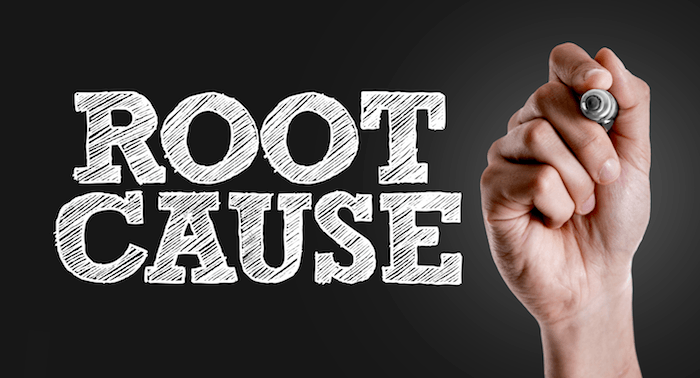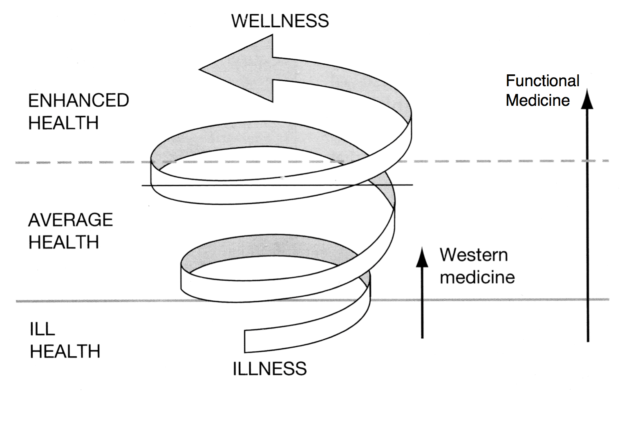This is a question I am commonly asked by patients and colleagues. While there is much overlap between these disciplines, there are several important characteristics which distinguish these different approaches to healthcare.
To start out, I want to clarify how all of the above fields are different from the predominating medical model currently being practiced: Conventional Medicine or Western Medicine.
Conventional Medicine:
a reductionistic model of medicine in which a strong emphasis is placed on characterizing disorders by diagnosis which usually reflects a collection of symptoms or behaviors rather than the cause of the disorder. Treatment relies heavily on the use of synthetic medications, invasive procedures and surgery.

The body is viewed as a series of organ systems which are typically segregated from one another. Assessment, treatment and even many of the practitioners themselves are conceptualized by the individual organ which the problem has been reduced to.
This model of medicine has made spectacular advances over the past century in certain fields such as: emergency medicine, infectious disease, diagnostic radiology and surgical interventions. For varied and sometimes unclear reasons, it was decided that this model should then be applied to the whole spectrum of healthcare, including chronic disease management, nutrition and preventative medicine with, at best, mediocre results.
Perpetual symptom suppression and the lack of root cause resolution has resulted in a continued deterioration of these integral aspects of healthcare and widespread dissatisfaction among patients and practitioners alike.
Holistic Medicine:
a model which strives to consider the whole body in an approach to health.
Treatment is focused on mind and spirit as much as body. They are all interconnected in this respect. The ultimate goal is to bring mind, body and spirit into coherence. If this can be accomplished then the absence of disease and the presence of optimal health should usually follow.
Holistic medicine is a beautiful concept, but is too vague and broad to be considered a defined model or approach to healthcare. A good functional medicine doctor is holistic, a good integrative medicine doctor is holistic, a good naturopath is holistic, a good conventional medical doctor is holistic. All good practitioners are holistic. You have to be able to see the big picture and connect the dots to get your patients better.
Holistic has now become more of a description of the practitioner’s style rather than a distinct approach to healthcare.
If you’re looking for a holistic doctor in Las Vegas or Henderson, please contact our office at (702) 616-4001.
Naturopathic Medicine or Naturopathy:
a model of healthcare identified best through the Latin expression ‘vis medicatrix naturae’ or ‘the healing power of nature’.

This model possesses a a broad spectrum of practice and a wide variety of therapeutic modalities. Some naturopaths will adhere to a strict practice of “nature cure” focusing only on diet, lifestyle modifications, detoxification and other natural interventions. Other naturopaths will offer additional non-conventional modalities such as acupuncture or homeopathy. At the other end of the spectrum are naturopathic physicians who extensively manipulate the body’s physiology and biochemistry by means of botanicals, nutraceuticals and pharmaceuticals. A majority of naturopathic practitioners incorporate pieces of all these elements in their practice and care for their patients.
Unfortunately, naturopathic physicians are still in the process of recovering from the extensive standardization of the American medical system which occurred in the early 20th century. Currently, naturopathic physicians have operating licensing boards in only 18 states. Many states (including Nevada) have no educational or professional standards in place to insure that practicing naturopaths are adequately trained.
I have a great amount of respect for the knowledge and clinical expertise of naturopathic physicians and I am proud to say that many of the physicians whom I have trained under are naturopaths, but the lack of licensure standards in a majority of US states is a significant obstacle which must be overcome to prevent inadequately trained practitioners from endangering patients and denigrating the reputation of this healthcare tradition.
To find out more about Naturopathic Doctor Licensure click here.
If you’re looking for a naturopathic doctor in Las Vegas or Henderson, please contact us here.
Integrative Medicine:
a model of healthcare in which conventional medicine is integrated with non-conventional or alternative modalities (such as herbs, homeopathy, chiropractic, acupuncture etc.).
The approach and thought process of the integrative practitioner may still be reductionistic and a strong emphasis may still be placed on characterizing disorders by diagnosis as in the conventional medicine model, albeit with a greatly enlarged toolbox for evaluations and treatments.

In the words of the world’s leading proponent of integrative medicine, Dr. Andrew Weil: “Integrative medicine is a healing-oriented medicine that takes account of the whole person (body, mind & spirit), including all aspects of lifestyle. It emphasizes the therapeutic relationship and makes use of all appropriate therapies, both conventional and alternative.”
So – integrative medicine is definitely holistic; it uses a conventional medicine toolbox; it uses a non-conventional medicine toolbox – including naturopathy. However, this enlarged integrative toolbox may or may not be applied at identifying the root cause of the illness. All integrative practitioners view the patient holistically and the most effective ones will be seeking the root cause of the illness, but root cause resolution is not a prerequisite to practicing this model of healthcare.
If you’re looking for an integrative medicine doctor in Las Vegas, please contact our office at (702) 616-4001.
Functional Medicine:
a personalized and integrative approach to healthcare which involves understanding the prevention, management and root causes of complex chronic disease. Functional medicine has taken from all the models discussed and offers the most comprehensive and effective approach to healthcare in the 21st century.
Conventional medical practices are integrated with non-conventional practices – the most important criteria being effectiveness & safety. It is practiced by licensed medical professionals originally trained in the reductionistic, diagnosis-based model of conventional medicine and who apply that thought process to appropriate acute medical issues. However, when dealing with chronic complex medical issues it employs a systems biology approach that views the person within a holistic framework and their problems within a biological network.
Functional medicine utilizes the most current scientific knowledge regarding how our genetics, environment and lifestyle interact as a whole system to diagnose and treat diseases based on patterns of dysfunction and imbalance – without necessarily treating the specific disease. Functional medicine treats the person who has the disease, not the disease the person has. For a more in-depth look at how Systems Biology is changing the practice of medicine click here.
Determining the root cause of the illness is an essential component of this system to the extent that a physician who does not practice in this manner is not practicing functional medicine. Symptom suppression is only used as a temporizing measure while seeking the root cause and when clinically necessary to optimize function of the patient.

Functional medicine is built on the foundation of conventional medicine. Functional medicine is holistic in how it views patients and the problems they present with. Functional medicine includes the core concepts of naturopathic medicine within its system. Functional medicine incorporates the open-mindedness of integrative medicine when determining the most effective modality needed to get the patient well. Functional medicine has built upon all these other approaches to healthcare to make available to the patient the most effective medical system currently known.
Conclusion
A perfectly healthy human being is incredibly complex. Add to that an illness or imbalance and that complexity grows exponentially. All of the approaches we have discussed have their merits, but the obvious choice would be an approach encompassing all of them while seeking the root cause of the illness using Systems Biology to unravel the networks that make up who we are.
That is functional medicine and that is how we practice medicine at Southwest Functional Medicine.
Armen Nikogosian, MD is a functional medicine doctor and is the founder and medical director of Southwest Functional Medicine and the Autism Biomed Center serving patients in Las Vegas and Henderson, Nevada. Southwest Functional Medicine is located at: 3291 E. Warm Springs Road, Suite 300, Las Vegas, NV 89120. Dr. Nikogosian is also available to out-of-state and international patients by remote consultation. To learn more about how we can help you click here or contact us directly.









